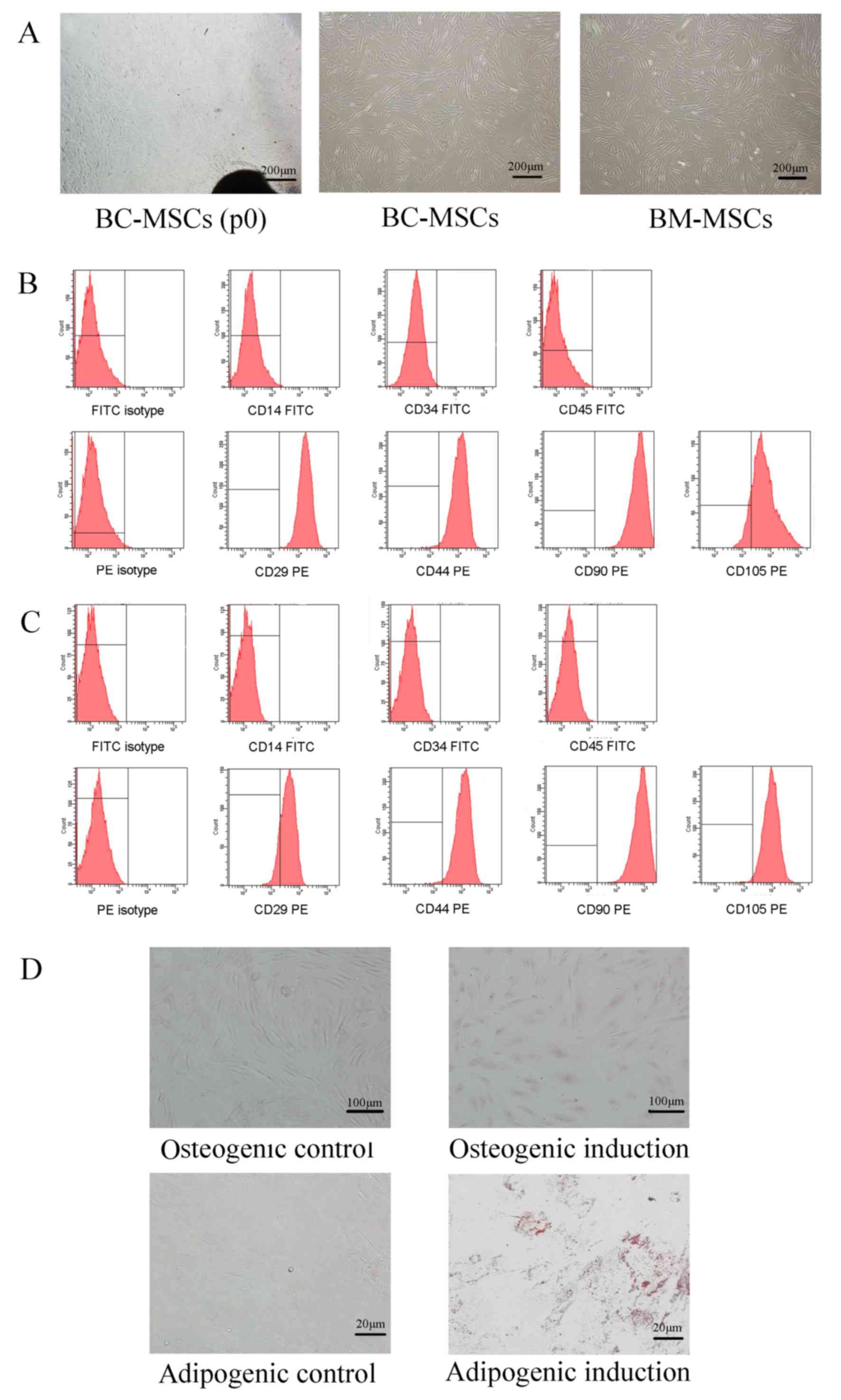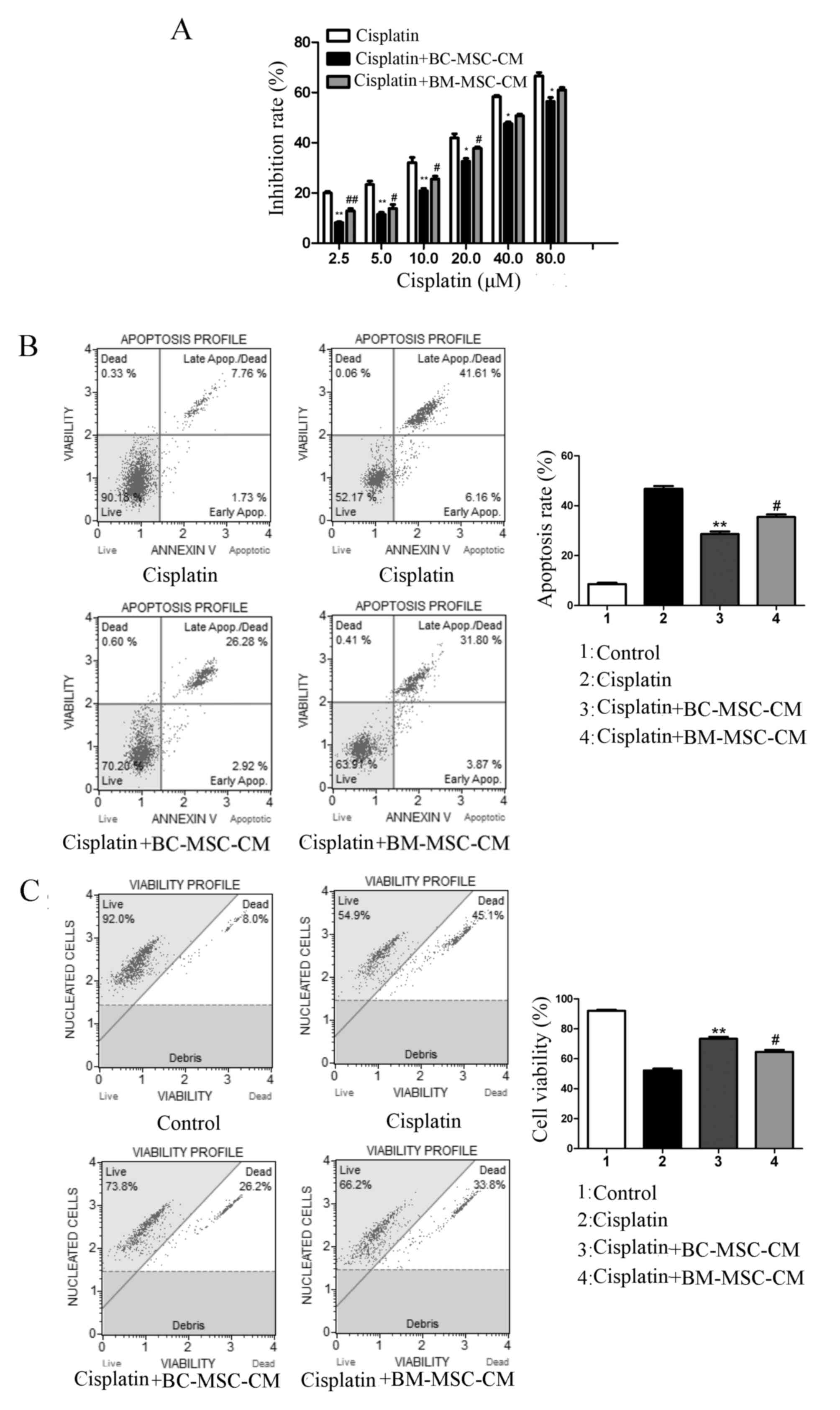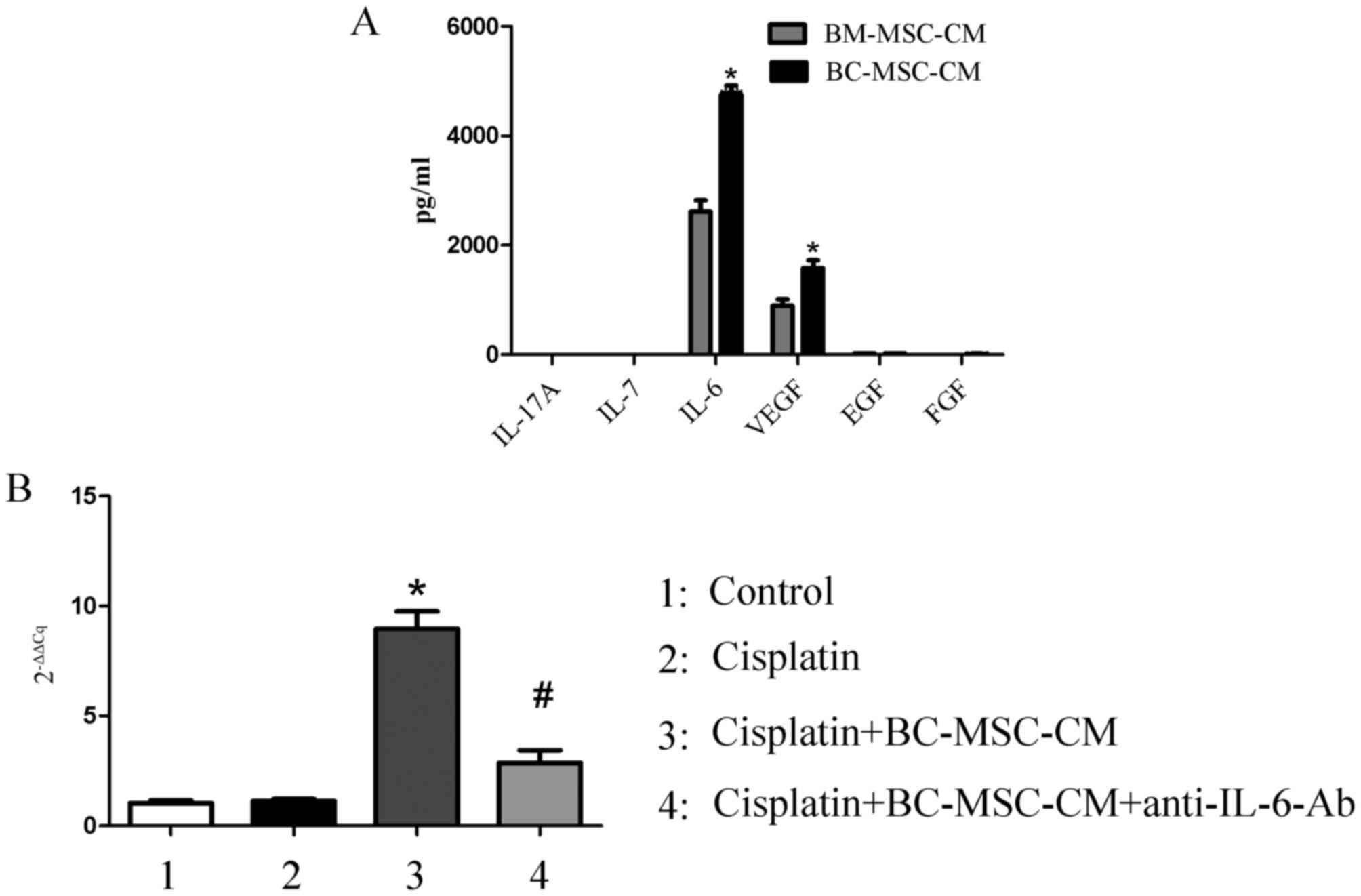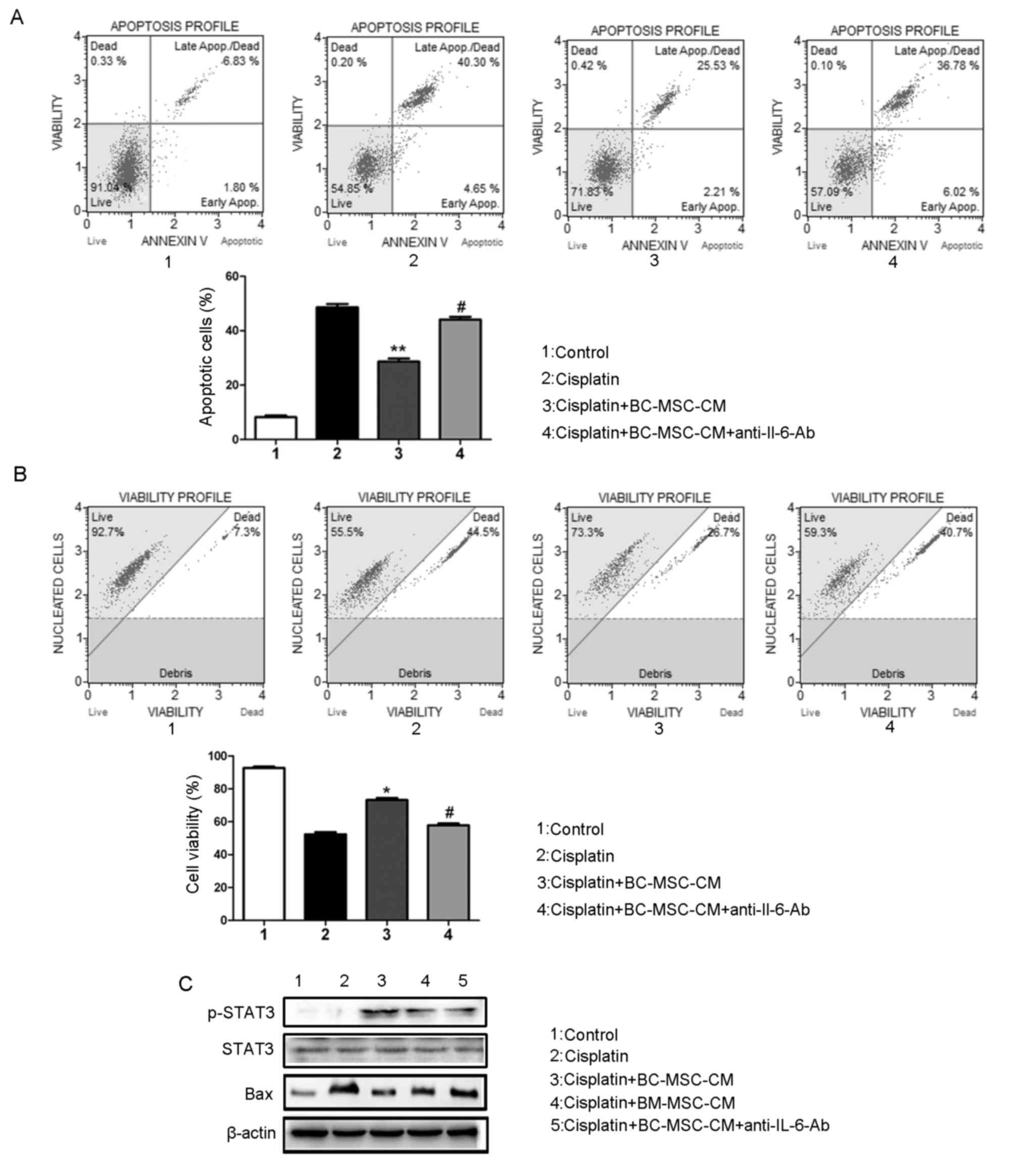|
1
|
Samavat H and Kurzer MS: Estrogen
metabolism and breast cancer. Cancer Lett. 356:231–243. 2015.
View Article : Google Scholar : PubMed/NCBI
|
|
2
|
Mao Y, Keller ET, Garfield DH, Shen K and
Wang J: Stromal cells in tumor microenvironment and breast cancer.
Cancer Metastasis Rev. 32:303–315. 2013. View Article : Google Scholar : PubMed/NCBI
|
|
3
|
Shirmanova MV, Druzhkova IN, Lukina MM,
Dudenkova VV, Ignatova NI, Snopova LB, Shcheslavskiy VI, Belousov
VV and Zagaynova EV: Chemotherapy with cisplatin: Insights into
intracellular pH and metabolic landscape of cancer cells in vitro
and in vivo. Sci Rep. 7:89112017. View Article : Google Scholar : PubMed/NCBI
|
|
4
|
Yu WK, Wang Z, Fong CC, Liu D, Yip TC, Au
SK, Zhu G and Yang M: Chemoresistant lung cancer stem cells display
high DNA repair capability to remove cisplatin-induced DNA damage.
Br J Pharmacol. 174:302–313. 2017. View Article : Google Scholar : PubMed/NCBI
|
|
5
|
Shi S, Tan P, Yan B, Gao R, Zhao J, Wang
J, Guo J, Li N and Ma Z: ER stress and autophagy are involved in
the apoptosis induced by cisplatin in human lung cancer cells.
Oncol Rep. 35:2606–2614. 2016. View Article : Google Scholar : PubMed/NCBI
|
|
6
|
Ethiraj P, Veerappan K, Samuel S and
Sivapatham S: Interferon β improves the efficacy of low dose
cisplatin by inhibiting NF-κB/p-Akt signaling on HeLa cells. Biomed
Pharmacother. 82:124–132. 2016. View Article : Google Scholar : PubMed/NCBI
|
|
7
|
Matsumoto M, Nakajima W, Seike M, Gemma A
and Tanaka N: Cisplatin-induced apoptosis in non-small-cell lung
cancer cells is dependent on Bax- and Bak-induction pathway and
synergistically activated by BH3-mimetic ABT-263 in p53 wild-type
and mutant cells. Biochem Biophys Res Commun. 473:490–496. 2016.
View Article : Google Scholar : PubMed/NCBI
|
|
8
|
Blanc C, Deveraux QL, Krajewski S, Jänicke
RU, Porter AG, Reed JC, Jaggi R and Marti A: Caspase-3 is essential
for procaspase-9 processing and cisplatin-induced apoptosis of
MCF-7 breast cancer cells. Cancer Res. 60:4386–4390.
2000.PubMed/NCBI
|
|
9
|
Cadamuro M, Brivio S, Spirli C, Joplin RE,
Strazzabosco M and Fabris L: Autocrine and paracrine mechanisms
promoting chemoresistance in cholangiocarcinoma. Int J Mol Sci.
18:pii: E149. 2017. View Article : Google Scholar : PubMed/NCBI
|
|
10
|
Li M, Li M, Yin T, Shi H, Wen Y, Zhang B,
Chen M, Xu G, Ren K and Wei Y: Targeting of cancer-associated
fibroblasts enhances the efficacy of cancer chemotherapy by
regulating the tumor microenvironment. Mol Med Rep. 13:2476–2484.
2016. View Article : Google Scholar : PubMed/NCBI
|
|
11
|
Borriello L and DeClerck YA: Tumor
microenvironment and therapeutic resistance process. Med Sci
(Paris). 30:445–451. 2014.(In French). View Article : Google Scholar : PubMed/NCBI
|
|
12
|
Flister MJ, Endres BT, Rudemiller N,
Sarkis AB, Santarriaga S, Roy I, Lemke A, Geurts AM, Moreno C, Ran
S, et al: CXM: A new tool for mapping breast cancer risk in the
tumor microenvironment. Cancer Res. 74:6419–6429. 2014. View Article : Google Scholar : PubMed/NCBI
|
|
13
|
Gould CM and Courtneidge SA: Regulation of
invadopodia by the tumor microenvironment. Cell Adh Migr.
8:226–235. 2014. View Article : Google Scholar : PubMed/NCBI
|
|
14
|
Sun Z, Wang S and Zhao RC: The roles of
mesenchymal stem cells in tumor inflammatory microenvironment. J
Hematol Oncol. 7:142014. View Article : Google Scholar : PubMed/NCBI
|
|
15
|
Scherzad A, Steber M, Gehrke T, Rak K,
Froelich K, Schendzielorz P, Hagen R, Kleinsasser N and Hackenberg
S: Human mesenchymal stem cells enhance cancer cell proliferation
via IL-6 secretion and activation of ERK1/2. Int J Oncol.
47:391–397. 2015. View Article : Google Scholar : PubMed/NCBI
|
|
16
|
Li W, Zhou Y, Yang J, Zhang X, Zhang H,
Zhang T, Zhao S, Zheng P, Huo J and Wu H: Gastric cancer-derived
mesenchymal stem cells prompt gastric cancer progression through
secretion of interleukin-8. J Exp Clin Cancer Res. 34:522015.
View Article : Google Scholar : PubMed/NCBI
|
|
17
|
Ooi YY, Dheen ST and Tay SS: Paracrine
effects of mesenchymal stem cells-conditioned medium on microglial
cytokines expression and nitric oxide production.
Neuroimmunomodulation. 22:233–242. 2015. View Article : Google Scholar : PubMed/NCBI
|
|
18
|
El-Khattouti A, Sheehan NT, Monico J,
Drummond HA, Haikel Y, Brodell RT, Megahed M and Hassan M: CD133+
melanoma subpopulation acquired resistance to caffeic acid
phenethyl ester-induced apoptosis is attributed to the elevated
expression of ABCB5: Significance for melanoma treatment. Cancer
Lett. 357:83–104. 2015. View Article : Google Scholar : PubMed/NCBI
|
|
19
|
Velletri T, Xie N, Wang Y, Huang Y, Yang
Q, Chen X, Chen Q, Shou P, Gan Y, Cao G, et al: P53 functional
abnormality in mesenchymal stem cells promotes osteosarcoma
development. Cell Death Dis. 7:e20152016. View Article : Google Scholar : PubMed/NCBI
|
|
20
|
Zhou K, Xia M, Tang B, Yang D, Liu N, Tang
D, Xie H, Wang X, Zhu H, Liu C and Zuo C: Isolation and comparison
of mesenchymal stem cell-like cells derived from human gastric
cancer tissues and corresponding ovarian metastases. Mol Med Rep.
13:1788–1794. 2016. View Article : Google Scholar : PubMed/NCBI
|
|
21
|
Hendijani F, Javanmard ShH, Rafiee L and
Sadeghi-Aliabadi H: Effect of human Wharton's jelly mesenchymal
stem cell secretome on proliferation, apoptosis and drug resistance
of lung cancer cells. Res Pharm Sci. 10:134–142. 2015.PubMed/NCBI
|
|
22
|
Livak KJ and Schmittgen TD: Analysis of
relative gene expression data using real-time quantitative PCR and
the 2(-Delta Delta C(T)) method. Methods. 25:402–408. 2001.
View Article : Google Scholar : PubMed/NCBI
|
|
23
|
Bergfeld SA and DeClerck YA: Bone
marrow-derived mesenchymal stem cells and the tumor
microenvironment. Cancer Metastasis Rev. 29:249–261. 2010.
View Article : Google Scholar : PubMed/NCBI
|
|
24
|
Song B, Kim B, Choi SH, Song KY, Chung YG,
Lee YS and Park G: Mesenchymal stromal cells promote tumor
progression in fibrosarcoma and gastric cancer cells. Korean J
Pathol. 48:217–224. 2014. View Article : Google Scholar : PubMed/NCBI
|
|
25
|
Kim SH, Bang SH, Kang SY, Park KD, Eom JH,
Oh IU, Yoo SH, Kim CW and Baek SY: Human amniotic membrane-derived
stromal cells (hAMSC) interact depending on breast cancer cell type
through secreted molecules. Tissue Cell. 47:10–16. 2015. View Article : Google Scholar : PubMed/NCBI
|
|
26
|
Castells M, Milhas D, Gandy C, Thibault B,
Rafii A, Delord JP and Couderc B: Microenvironment mesenchymal
cells protect ovarian cancer cell lines from apoptosis by
inhibiting XIAP inactivation. Cell Death Dis. 4:e8872013.
View Article : Google Scholar : PubMed/NCBI
|
|
27
|
Chang WW, Hu FW, Yu CC, Wang HH, Feng HP,
Lan C, Tsai LL and Chang YC: Quercetin in elimination of tumor
initiating stem-like and mesenchymal transformation property in
head and neck cancer. Head Neck. 35:413–419. 2013. View Article : Google Scholar : PubMed/NCBI
|
|
28
|
López J, Poitevin A, Mendoza-Martínez V,
Pérez-Plasencia C and García-Carrancá A: Cancer-initiating cells
derived from established cervical cell lines exhibit stem-cell
markers and increased radioresistance. BMC Cancer. 12:482012.
View Article : Google Scholar : PubMed/NCBI
|
|
29
|
Kansy BA, Dißmann PA, Hemeda H, Bruderek
K, Westerkamp AM, Jagalski V, Schuler P, Kansy K, Lang S, Dumitru
CA and Brandau S: The bidirectional tumor-mesenchymal stromal cell
interaction promotes the progression of head and neck cancer. Stem
Cell Res Ther. 5:952014. View
Article : Google Scholar : PubMed/NCBI
|
|
30
|
Behnan J, Isakson P, Joel M, Cilio C,
Langmoen IA, Vik-Mo EO and Badn W: Recruited brain tumor-derived
mesenchymal stem cells contribute to brain tumor progression. Stem
Cells. 32:1110–1123. 2014. View Article : Google Scholar : PubMed/NCBI
|
|
31
|
Ji R, Zhang B, Zhang X, Xue J, Yuan X, Yan
Y, Wang M, Zhu W, Qian H and Xu W: Exosomes derived from human
mesenchymal stem cells confer drug resistance in gastric cancer.
Cell Cycle. 14:2473–2483. 2015. View Article : Google Scholar : PubMed/NCBI
|
|
32
|
Lou G, Song X, Yang F, Wu S, Wang J, Chen
Z and Liu Y: Exosomes derived from miR-122-modified adipose
tissue-derived MSCs increase chemosensitivity of hepatocellular
carcinoma. J Hematol Oncol. 8:1222015. View Article : Google Scholar : PubMed/NCBI
|
|
33
|
Kurtova AV, Balakrishnan K, Chen R, Ding
W, Schnabl S, Quiroga MP, Sivina M, Wierda WG, Estrov Z, Keating
MJ, et al: Diverse marrow stromal cells protect CLL cells from
spontaneous and drug-induced apoptosis: Development of a reliable
and reproducible system to assess stromal cell adhesion-mediated
drug resistance. Blood. 114:4441–4450. 2009. View Article : Google Scholar : PubMed/NCBI
|
|
34
|
van der Zee M, Sacchetti A, Cansoy M,
Joosten R, Teeuwssen M, Heijmans-Antonissen C, Ewing-Graham PC,
Burger CW, Blok LJ and Fodde R: IL6/JAK1/STAT3 signaling blockade
in endometrial cancer affects the ALDHhi/CD126+ stem-like component
and reduces tumor burden. Cancer Res. 75:3608–3622. 2015.
View Article : Google Scholar : PubMed/NCBI
|
|
35
|
Hossain A, Gumin J, Gao F, Figueroa J,
Shinojima N, Takezaki T, Priebe W, Villarreal D, Kang SG, Joyce C,
et al: Mesenchymal stem cells isolated from human gliomas increase
proliferation and maintain stemness of glioma stem cells through
the IL-6/gp130/STAT3 pathway. Stem Cells. 33:2400–2415. 2015.
View Article : Google Scholar : PubMed/NCBI
|
|
36
|
Mochizuki D, Adams A, Warner KA, Zhang Z,
Pearson AT, Misawa K, McLean SA, Wolf GT and Nör JE: Anti-tumor
effect of inhibition of IL-6 signaling in mucoepidermoid carcinoma.
Oncotarget. 6:22822–22835. 2015. View Article : Google Scholar : PubMed/NCBI
|
|
37
|
Rodriguez-Barrueco R, Yu J, Saucedo-Cuevas
LP, Olivan M, Llobet-Navas D, Putcha P, Castro V, Murga-Penas EM,
Collaz-Lorduy A, Castillo-Martin M, et al: Inhibition of the
autocrine IL-6-JAK2-STAT3-calprotectin axis as targeted therapy for
HR-/HER2+ breast cancers. Genes Dev. 29:1631–1648. 2015. View Article : Google Scholar : PubMed/NCBI
|
|
38
|
Ren T, Shan J, Qing Y, Qian C, Li Q, Lu G,
Li M, Li C, Peng Y, Luo H, et al: Sequential treatment with AT-101
enhances cisplatin chemosensitivity in human non-small cell lung
cancer cells through inhibition of apurinic/apyrimidinic
endonuclease 1-activated IL-6/STAT3 signaling pathway. Drug Des
Devel Ther. 8:2517–2529. 2014. View Article : Google Scholar : PubMed/NCBI
|


















